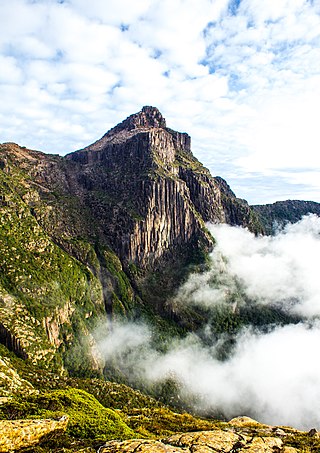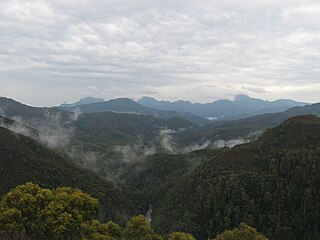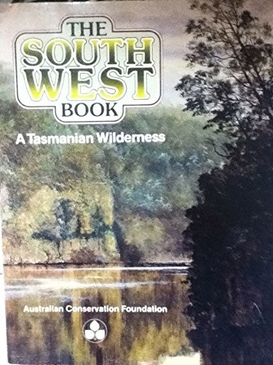Related Research Articles

Southwest National Park is an Australian national park located in the south-west of Tasmania, bounded by the Franklin-Gordon Wild Rivers National Park to the north and the Hartz Mountains National Park to the east. It is a part of a chain of national parks and state reserves that make up the Tasmanian Wilderness World Heritage Area. Covering an area of 6,183 km2 (2,387 sq mi), it is Tasmania's largest national park.

Lake Pedder, once a glacial outwash lake, is a man-made impoundment and diversion lake located in the southwest of Tasmania, Australia. In addition to its natural catchment from the Frankland Range, the lake is formed by the 1972 damming of the Serpentine and Huon rivers by the Hydro Electric Commission of Tasmania for the purposes of hydroelectric power generation.

The United Tasmania Group (UTG) is generally acknowledged as the world's first Green party to contest elections. The party was formed on 23 March 1972, during a meeting of the Lake Pedder Action Committee (LPAC) at the Hobart Town Hall in order to field political candidates in the April 1972 state election.

The Franklin Dam or Gordon-below-Franklin Dam project was a proposed dam on the Gordon River in Tasmania, Australia, that was never constructed. The movement that eventually led to the project's cancellation became one of the most significant environmental campaigns in Australian history.

Lake Gordon is a man-made reservoir created by the Gordon Dam, located on the upper reaches of the Gordon River in the south-west region of Tasmania, Australia.

The Gordon River is a major perennial river located in the central highlands, south-west, and western regions of Tasmania, Australia.

Hydro Tasmania, known for most of its history as the Hydro-Electric Commission (HEC) or The Hydro, is the trading name of the Hydro-Electric Corporation, a Tasmanian Government business enterprise which is the predominant electricity generator in the state of Tasmania, Australia. The Hydro was originally oriented towards hydro-electricity, due to Tasmania's dramatic topography and relatively high rainfall in the central and western parts of the state. Today Hydro Tasmania operates thirty hydro-electric and one gas power station, and is a joint owner in three wind farms.
Olegas Truchanas was a Lithuanian-Australian conservationist and nature photographer.

The Bass Strait Triangle is the waters that separate the states of Victoria and Tasmania, including Bass Strait, in south-eastern Australia. The term Bass Strait Triangle appears to have been first used following the disappearance of Frederick Valentich in 1978 although the region had a bad reputation long before that.

Eric Elliott Reece, AC was Premier of Tasmania on two occasions: from 26 August 1958 to 26 May 1969, and from 3 May 1972 to 31 March 1975. His 13 years as premier remains the second longest in Tasmania's history, Only Robert Cosgrove has served for a longer period as premier. Reece was the first Premier of Tasmania to have been born in the 20th century.
The Tasmanian Wilderness Society was a Tasmanian environmental group that started in 1976 in response to a proposal by the state's Hydro Electric Commission to construct a dam on the Gordon River, downstream from the Franklin River, that led to the Franklin Dam controversy. The group evolved from membership of the South West Tasmania Action Committee and members of the United Tasmania Group. It was active in public protest about the issues of Wilderness, the Franklin River and South West Tasmania.

South West Tasmania is a region in Tasmania that has evoked curiosity as to its resources over the duration of European presence on the island.

The Scotts Peak Dam Road is the most southerly point of road access into Southwest National Park, Tasmania, Australia.
The Scotts Peak Dam is a rockfill embankment dam without a spillway across the Huon River, located in the South West region of Tasmania, Australia.
The Edgar Dam is an earthfill embankment saddle dam without a spillway, located offstream in the South West region of Tasmania, Australia.

The South West Book - A Tasmanian Wilderness is a book published by the Australian Conservation Foundation in 1978 during concern following the damming of Lake Pedder in Tasmania.
Brenda Hean (1910-1972) was a member of the Lake Pedder Action Committee (LPAC) and a resident of Hobart, Tasmania who disappeared at the time of the flooding of Lake Pedder.
Olegas is an opera based on the life of Lithuanian-born Tasmanian wilderness photographer Olegas Truchanas. Music for the opera was composed by Constantine Koukias, Tasmanian composer and opera director of Greek ancestry based in Amsterdam, where he is known by his Greek name of Konstantin Koukias. The libretto was written by Natasha Cica.
Helen Gee was an Australian author, editor, conservationist and environmental activist.
South West Tasmania Action Committee was a group started after the flooding of the lake in South West Tasmania known as Lake Pedder to create the Gordon Dam catchment.
References
- ↑ Save Lake Pedder National Park Committee (1967), Newsletter, The Committee, retrieved 6 November 2017
- ↑ Sims, Peter C. (Peter Charles,) (1995), Lake Pedder : the awakening, Pedder 2000 Committee, ISBN 978-0-646-20321-8
{{citation}}: CS1 maint: multiple names: authors list (link) - ↑ Save Lake Pedder National Park Committee (1967), Records , retrieved 6 November 2017
- ↑ Symposium to Enquire into the Hydro-Electric Commission, Environment, and Government in Tasmania (1971 : Hobart); Jones, Richard (1972), Damania : proceedings of a symposium to enquire into the H.E.C., Environment, and Government in Tasmania, Hobart, November, 1971, Fullers Bookshop (Publishing Division), ISBN 978-0-85853-004-1
{{citation}}: CS1 maint: multiple names: authors list (link) CS1 maint: numeric names: authors list (link) - ↑ The South West Book page 277 Chronology – same year the Tasmanian Legislative council defeated a vote on a referendum on Lake Pedder by a 14-3 vote...
- ↑ page 11 of Walker, PF (1987), The United Tasmania Group , retrieved 18 November 2018
- ↑ Southwell, Les; South West Tasmania Action Committee. Victorian Branch, (issuing body.) (1978), Report on south-west Tasmania wilderness photography study, [Victoria] South-West Tasmania Action Committee, retrieved 6 November 2017
- ↑ Millwood, Scott (2008), Whatever happened to Brenda Hean?, Allen & Unwin, ISBN 978-1-74175-611-1
- ↑ Millwood, Scott; McMahon, Michael; Robertson, Mira (2009), Whatever happened to Brenda Hean? (DVD ed.), Screen Australia : Australian Broadcasting Corporation, ISBN 978-0-9806862-4-1
- ↑ Johnson, Dick; Australian Union of Students; Lake Pedder Action Committee; Lake Pedder Action Committee. Victorian Branch (1972), Lake Pedder : why a national park must be saved, Lake Pedder Action Committees of Victoria and Tasmania and the Australian Union of Students, ISBN 978-0-9599018-0-1
- ↑ "Vigil at Lake Pedder". The Canberra Times . 13 March 1972. p. 3. Retrieved 31 July 2015– via National Library of Australia.
- ↑ The group was established in 1976 from the members of the Southwest Action Committee - see The Wilderness Society (tasmania Inc) NG2155 [Records], LINC Tasmania, 1976, retrieved 17 November 2018
- ↑ "Home". lakepedder.org.
- ↑ Sharples, C. E. (Chris E.); University of Tasmania. Centre for Environmental Studies; Symposium on Lake Pedder : Values and Restoration (1995 : University of Tasmania) (2001), Lake Pedder : values and restoration : the proceedings of a symposium held on 8th April 1995 at the University of Tasmania, Hobart (1st ed.), Centre for Environmental Studies, Dept. of Geography and Environmental Studies, University of Tasmania, ISBN 978-0-85901-970-5
{{citation}}: CS1 maint: numeric names: authors list (link) - ↑ Sims, Peter C. (Peter Charles,) (1995), Lake Pedder : the awakening, Peter C. Sims (published 2012), ISBN 978-0-646-20321-8
{{citation}}: CS1 maint: multiple names: authors list (link) - ↑ Grieve, Anna; Best, Steve (1997), Lake Pedder, Film Australia, retrieved 31 July 2015